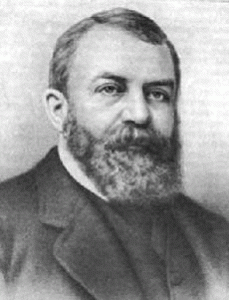 Today (December 22) is the day in 1899 when Dwight L. Moody died. The Christian world was devastated by the passing of this evangelical giant. Moody had been the figurehead for the aggressive, revivalist evangelicalism of the nineteenth century, and when he died just ten days from the end of the century, it seemed symbolic. At his funeral, A. T. Pierson said:
Today (December 22) is the day in 1899 when Dwight L. Moody died. The Christian world was devastated by the passing of this evangelical giant. Moody had been the figurehead for the aggressive, revivalist evangelicalism of the nineteenth century, and when he died just ten days from the end of the century, it seemed symbolic. At his funeral, A. T. Pierson said:
When a great tree falls, you know its greatness, not only by its branches, but by its roots, by how much soil it tore up as it fell. I know of no other man who, falling in this century, has uprooted a wider tract than this man who has just left us.
Pierson reviewed the giants who had departed in the final decades of the century: “Charles Spurgeon of London, A. J. Gordon of Boston, Catherine Booth, mother of the Salvation Army, and George Muller of Bristol, England,” and declared that “not one made the worldwide commotion in their departures that Dwight L. Moody has caused.”
Moody’s accomplishments were astonishing: Massive evangelistic outreach at the Chicago World’s Fair, a round-the-world tour with Sankey, a network of educational ventures, and a revitalizing of many denominations. As they buried him, the world’s evangelicals thought the golden age was past, and it was time to settle down.
But R.A. Torrey had another idea, and it was his funeral sermon for Dwight Moody that sounded the prophetic note his generation needed. In the conclusion of that sermon, Torrey took as his text Joshua 1:2: “Moses my servant is dead. Now, therefore, arise, go over this Jordan, thou, and all this people, unto the land which I do give to them.”
According to the report in A.P. Fitt’s Record of Christian Work, Torrey paraphrased the verse for present application: “Moody my servant is dead. Now, therefore, arise…”
The death of Mr. Moody is a call to go forward –a call to his children, to his associates, to ministers of the Word everywhere, to the whole Church: ‘Go forward. Our leader has fallen.’
‘Our leader has fallen; let us give up the work,’ some would say. Not for a minute.
Listen to what God says: “Your leader has fallen. Move forward. Moses my servant is dead; therefore arise, go in and possess the land. Be strong and of good courage, be not afraid. As I was with Moody, so I will be with thee. I will not fail thee nor forsake thee.’
The unanimity upon this point of all those who have been associated with him is remarkable. The great institutions that he has established at Northfield, Mt. Hermon, and Chicago, and the work they represent, must be pushed to the front as never before.
Mr. Moody himself said, when he felt the call of death at Kansas City: ‘I know how much better it would be for me to go, but we are on the verge of a great revival, like that of 1857, and I want to have a hand in it.’
He will have a mighty hand in it. His death, with the triumphal scenes that surround it, are part of God’s way of answering the prayers that have been so long ascending in our land.
(Torrey’s funeral sermon for Moody is reported in several different forms, with the essential points clear but the phrasing varying considerably. I don’t know which report is most accurate, but the most satisfyingly literary form is this one.)
Torrey was in his mid-forties when he preached this sermon, and in the next few years he took the lead in rising and going forward to do great things. He consolidated the work of the Bible Institute movement, preached revival on four continents, and kept building on the foundations laid by Moody. One of the greatest proofs that Torrey had the Moody anointing is that he learned the right lesson from the death of a great evangelical leader: to press on.